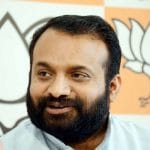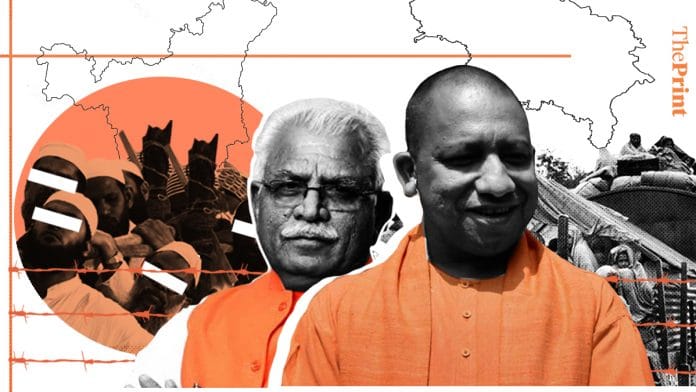Haryana Chief Minister Manohar Lal Khattar announced Sunday that his government will “implement the NRC”. Earlier, Uttar Pradesh Chief Minister Yogi Adityanath lauded the NRC exercise in Assam as an “important and brave decision”, which could be enacted in his state if the need arises.
ThePrint asks: Adityanath, Khattar want NRC in UP and Haryana: Is India looking at another ‘Partition’?
Modi govt’s decisions — NRC or Article 370’s abrogation — are aimed at Rashtriya Ekta & Rashtriya Akhandta
 Chandra Mohan
Chandra Mohan
BJP UP Spokesperson
On NRC, there is absolutely no question of ‘Partition’. Whatever the Narendra Modi government is doing, be it NRC or abrogation of Article 370, is meant for Rashtriya Ekta and Rashtriya Akhandta (national unity and integrity).
Currently, no directions have been issued regarding the implementation of NRC in Uttar Pradesh. Only when directions come from the government and reports are drawn up can one speak on the subject with clarity and whether the exercise will benefit people.
UP Chief Minister Yogi Adityanath has commended the NRC exercise and called it “an important and a brave” decision. It is too soon to comment on an NRC exercise in UP, but as the chief minister of the state, Adityanath’s say will be final.
NRC was a much-needed step in Assam, same holds true for abrogation of Article 370 in Jammu and Kashmir. Both the moves have been welcomed by people.
Also read: Assam wanted an end to its ethnic conflict. In the end, it got an NRC that nobody accepts
NRC aims to repair wrongs committed 70 years ago by inflicting misery on those born long after those events
 Gilles Verniers
Gilles Verniers
Assistant Professor of Political Science, Ashoka University
The proposed expansion of the NRC beyond Assam is unlikely to generate a new ‘Partition’ as such, but it is yet another step towards a re-definition of citizenship along religious and ethnic lines, especially in states where external migration is fairly irrelevant as an issue compared to internal migration.
This policy could lead to a witch hunt among internal migrants and would also disproportionately affect the most disadvantaged segments of the population. A recent survey conducted by the Indo-Global Social Service Society reveals that 30 per cent of the homeless population in Indian cities don’t possess any form of documentation.
The NRC as a policy seeks to cast a doubt on the citizenship status of select segments of the population, without any consideration for the practical implications of creating sub-class citizens. Instead, it focuses on the signal it sends to the main support base and to the larger population, rather than fix an actual problem. The NRC does not seek to address a current migration crisis, but aims to repair wrongs committed more than 70 years ago by inflicting misery on individuals born long after those events.
In 1919, German social theorist Max Weber introduced a distinction between what he called the ethic of conviction and the ethic of responsibility. The former subjugates the choice of means and ends to the values or vision one pursues, while the latter mandates that political choices be evaluated and adopted in consideration of their implications or consequences to the real world. The NRC may proceed from an ethic of conviction, but clearly discards any consideration about its consequences on individuals.
Also read: On NRC’s 19 lakhs, Modi govt must not ignore Sardar Patel’s advice on citizenship
NRC is required throughout India to ensure that jobs and resources don’t go to outsiders
 Sandeep Joshi
Sandeep Joshi
General Secretary, BJP Haryana
The notion that India is looking at another ‘Partition’ because of the NRC is absolutely false and untrue. It is important to understand that the National Register of Citizens was introduced in Assam and is being proposed in other states to ensure that outsiders, essentially ‘unauthorised’ people, are sent back to their countries. This is to ensure that the citizens of India get priority. So, the question of partition does not even arise.
We have not yet received any instructions on any plans to implement the NRC in Haryana, but I believe that it is an exercise that is required across India. This is because there are many ‘outsiders’ in India. The NRC is required more in states with border areas.
Even though Haryana Chief Minister Manohar Lal Khattar has said that his government will implement the NRC to keep out ‘unauthorised’ people, it is too soon to say when and in what manner it will be implemented. But it is important to note that this exercise is for the benefit of the people of India, and ensures that resources and jobs do not go in the hands of outsiders.
Sheer hypocrisy of BJP to oppose final NRC in Assam & now call for its implementation in Haryana
 Aman Wadud
Aman Wadud
Lawyer at Gauhati High Court
People in Assam supported the NRC for different reasons. People who were suspected to be “illegal migrants” became the biggest supporters of the NRC. They thought a free and fair NRC will bring an end to the abuse of Indian citizens in the name of “illegal migrants”.
The NRC busted the myth of illegal migration — all these while we heard that there were millions of foreigners in Assam, but the NRC excluded only 1.9 million people. Now it’s apparent that large numbers of these 1.9 million are Indian citizens. Parents included in the final list and their children excluded are a phenomenon now.
The BJP was the biggest supporter of the NRC, but it now opposes the final NRC despite the fact that it was monitored by the Supreme Court and executed by government employees. It’s sheer hypocrisy of the BJP to first oppose the outcome of NRC in Assam, but now call for NRC’s implementation in Haryana. BJP has failed in Uttar Pradesh and Haryana on all fronts — law and order is in shambles, there is no generation of employment. The BJP is using the NRC to divert attention from the real issues.
If demonetisation had economic cost, nation-wide NRC will have social cost that will linger for years
 Chinmay Tumbe
Chinmay Tumbe
Assistant Professor, Economics Area at IIM Ahmedabad and author of India Moving: A History of Migration
The NRC exercise in Assam has shown that the number of the so-called ‘illegal’ immigrants is nowhere close to the 20-million figure bandied about for the past two decades. If one goes by the 2011 Census, then the number of Bangladeshi immigrants in UP and Haryana is only a few thousand. They are contributing to the Indian economy in whatever capacity they can — in the same way Indian emigrants, legal and illegal, do when they go abroad.
Like demonetisation, a nation-wide NRC rollout makes no sense from a cost-benefit perspective, because the costs outweigh the benefits any day. It will, however, like demonetisation, be perceived as ‘action taken’ and that’s why it seems politically so lucrative. If demonetisation had an economic cost that we are still yet to fully recover from, the nation-wide NRC exercise will have a social cost that will linger for years to come. The NRC is nothing but narak or hell.
By Revathi Krishnan, journalist at ThePrint







If demonetisation had economic cost, nation-wide NRC will have social cost that will linger for years. Yes but what if the listener is not even aware that he is clue less about the issue or its consequences? It will remain as is the discussions in Parliament. You go on recors. That is it.
The tenure of Yogiji in UP coincides with a deep gash in investment, since it started a little after Demonetisation. UP has never been a favoured destination. However, Haryana has received a lot of FDI in manufacturing, participated fully in the real estate boom. The priorities of both CMs ought to be economic revival. One does not know if OTC asked Shri Khattar about the woes of the automobile sector, the deepening crisis in real estate. Both gentlemen are in a sense Accidental Chief Ministers. They could have justified their somewhat surprising selection by providing first rate governance. Something as basic as law and order.
Let’s be perfectly honest. In the case of Assam, there was the Assam Accord and a cut off date that coincided with the start of the Bangladesh freedom struggle, 25th March 1971. The Other was the Bengali, religion was not the dominant emotion at that time. The final draft is a sore disappointment, since Hindus outnumber Muslims 2 : 1 in the figure of 1.9 million aliens. 2. Haryana and UP will not repeat that mistake. No Hindu is at risk. Not even a Madrasi who has settled in either state. It is evident which names and surnames will be subjected to MRI scans. Please don’t do it would be a humble citizen’s prayer.
It is one thing to excavate a mountain and end up with a lady rat. [ It sounds so much better in the vernacular. ] However, it is altogether more unstatesmanlike to place a couple of dead mice in one’s hands and proceed to disturb the solitary splendour of a timeless mountain. These wanton acts will undermine our sense of solidarity and nationhood. We are a very complex nation, a combination of history and geography. At the risk of being gravely misunderstood, one can say that without the accident of British rule, our map could have looked very different. So let us not inflame passions that could consume us. That would have been Sardar Patel’s advice to us.
One should not be required to prove ones citizenship, the onus must be on the government to prove that you are not a citizen.
Last December I lost my passport in Moscow, the Indian Embassy asked questions and required me to jump through some odd bureaucratic hoops, this went on for weeks, over several visits and still no replacement passport was forthcoming.
At last I got fed up with this petty officialdom. I said “Do you know, I don’t require a passport, as a citizen of India to enter my own country, it is my right!”.
The official said “you give us the evidence and have already proved yourself a citizen, but since you are a Muslim we want to make sure you have not visited Pakistan” that is why your case is taking so long.
This is an example kind of discrimination Muslims citizens face under this government , There seem to be different rules for Muslims
We Muslims of India are increasingly being treated as second class citizens in a Hindu country,
Muslims in India face these blockages too frequently when getting work done involving government officials.